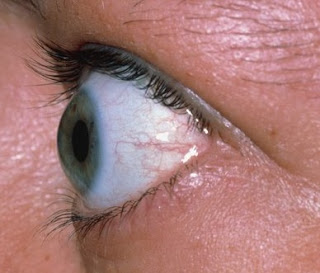Exophthalmos, Causes, Diagnosis, Treatment, Prevention, Complications
Exophthalmos is a condition in which the eyeball protrudes abnormally, giving the eye a bulging appearance. This condition can occur in one eye or both eyes, and is most often caused by excess thyroid hormone.
 |
| Exophthalmos, Causes, Diagnosis, Treatment, Prevention, Complications |
In addition to thyroid disease, exophthalmos in adults can be caused by injuries and tumors in the eye socket. While in children, exophthalmos is most often caused by orbital cellulitis.
Exophthalmos or proptosis makes it difficult to blink so that the cornea cannot be lubricated properly. If left untreated, exophthalmos can cause complications in the form of injuries to the cornea, decreased visual acuity, and even blindness.
Causes of Exophthalmos
Exophthalmos occurs due to swelling in the contents of the eye socket or due to a tumor in the eye socket.
Swelling of the contents of the eye socket is most often caused by Graves' disease, which is an autoimmune disease that attacks the thyroid gland. This disease causes the thyroid gland to produce too much thyroid hormone (hyperthyroidism).
In Graves' disease, in addition to attacking the thyroid gland, immune cells can also attack the contents of the eye socket. As a result, the contents of the eye socket, such as the muscles and soft tissue around the eyeball, swell, making the eye appear to protrude.
In addition to Graves' disease, exophthalmos can also be caused by other diseases or conditions, such as:
- Congenital glaucoma
- Orbital cellulitis
- Tumors in the eye socket, eg neuroblastoma in the eye or sarcoma of the eye
- Injury to the eye, especially if the injury causes bleeding inside the eye socket
Exophthalmic symptoms
As previously mentioned, the main symptom of exophthalmos is protrusion of one or both eyeballs, making it look like the sufferer is bulging. In addition, people with exophthalmos can also experience symptoms in the form of:
- Pressure or pain in the eye
- Swollen eyelids
- Difficulty moving the eyeballs or blinking
- Dry, red, or watery eyes
- Feeling like something is blocking when moving the eye
- Eyes are sensitive to light
- Blurred vision or double vision
When to see a doctor
Immediately consult a doctor if you experience the symptoms mentioned above. You should also immediately go to the nearest hospital emergency room if you experience symptoms such as:
- Red eyes or eye pain
- Severe headache
- Blurred vision or seeing objects double
- Fever
- Pulsating exophthalmos
You should also take your child or baby to the doctor immediately if he has exophthalmos.
Exophthalmos diagnosis
To diagnose exophthalmos, the doctor will ask questions and answers about the patient's symptoms and medical history. After debriefing, the doctor will do an eye examination.
Next, the doctor will perform an examination using a slit lamp. This examination is done by examining the structure of the front of the eye, to detect any abnormalities. In addition, the doctor will assess the movement of the eyeballs.
If the doctor suspects exophthalmos is due to thyroid disease, the doctor will also feel the patient's neck to check the thyroid gland.
The doctor can also carry out further examinations, such as:
- Exophthalmometry, to measure how far the eyeball is out of the eye socket
- Blood tests, to measure thyroid hormone levels and signs of infection
- CT scan and MRI of the eye, to look for tumors, damage in the eye, or swelling in the eye socket
Exophthalmos Treatment
Exophthalmos treatment aims to relieve symptoms and address the underlying cause. Doctors can give corticosteroid injections or eye drops to reduce inflammation. Eye drops can also be given to treat dry eyes.
Patients will also be advised to wear sunglasses, to protect the eyes from exposure to ultraviolet light and pollutants that can irritate the eyes.
If the exophthalmos is caused by thyroid disease, the doctor can give drugs, such as teprotumumab and methimazole. Doctors may also suggest radiation therapy and surgical removal of part or all of the thyroid.
Meanwhile, if exophthalmos is caused by a tumor, surgical removal of the tumor, radiotherapy, chemotherapy or immunotherapy can also be performed by a doctor.
In addition to providing treatment, doctors will advise patients who smoke to stop the habit. This is because smoking can reduce the effectiveness of exophthalmos treatment.
Exophthalmic complications
Untreated exophthalmos can lead to the following complications:
- Permanent double vision
- Corneal damage from not being able to blink
- Ophthalmic nerve damage
- Blind
Prevention of exophthalmos
Some of the efforts you can take to prevent exophthalmos are:
- Undergo regular control and treatment if suffering from thyroid disease or other autoimmune diseases
- Undergo routine eye examinations once every 1–2 years
- Quit smoking
- Living a clean and healthy lifestyle to prevent infection
- Check your teeth regularly, to prevent infection that can spread and become orbital cellulitis
Related Searches:
- exophthalmos definition,
- what is exophthalmos,
- proptosis vs exophthalmos,
- exophthalmos vs proptosis,
- exophthalmos graves disease,
- exophthalmos pronunciation,
- exophthalmos treatments,
- definition exophthalmos,
- exophthalmos dog,
- exophthalmos icd 10,
- exophthalmos in dogs,
- thyroid exophthalmos,
- exophthalmos is a symptom of which endocrine disorder?,
- graves exophthalmos,
- exophthalmos is a sign of which of the following endocrine disorders?,
- exophthalmos is a disorder caused by hypersecretion from the,
- exophthalmos is a symptom of which endocrine disorder,
- what is exophthalmos?,
- exophthalmos treatment,
- exophthalmos is a sign of which of the following endocrine disorders,

Post a Comment for "Exophthalmos, Causes, Diagnosis, Treatment, Prevention, Complications"